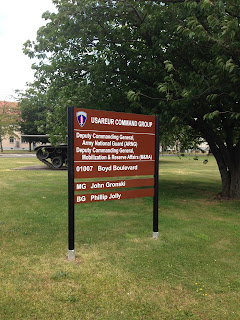When I visited Wiesbaden Air Base this summer, the tank in the photo above was the only tank on the base. When I arrived the first time in October 1976, the 54 tanks of 1st Battalion, 70th Armor were combat loaded with 63 rounds of cannon ammo. We were on the East-West border within 48 hours after we landed at Rhein-Main Air Base.
The building above was post headquarters for 4th Brigade, 4th Infantry Division as soon as we took over the base. It still serves as headquarters, now for the reserve forces in Europe, commanded by Major General John Gronski, my division commander in Pennsylvania before he took over this new command in Europe.
This building was my barracks in 1976-77, before I moved off post. It is offices now. Bravo Company was mostly on the second floor. The barracks were carpeted and had relatively luxurious living spaces. I shared a room with three other sergeants. Enlisted men were eight to a room. Sergeant Daniel Rosera was the first one to buy 300 Watts of stereo to play Peter Frampton Comes Alive out his barracks window. Her also bought a mic so he could belch at 300 Watts. He could belch short sentences. A man of considerable talents.
Across this fences is a few dozen trucks and a dozen more Blackhawk helicopters. The tanks are gone and aircraft sit where M109 howitzers and their support vehicles were parked 40 years ago.
I rode up to Wiesbaden Air Base from Darmstadt and visited John and Berti Gronski. They live in the housing area. Gronski and his wife still ride. I didn't find out until this visit that they were really serious riders. When Gronski left active duty as a lieutenant in 1981, he and Berti rode home from Washington state to Mossic, Pa. on bicycles! John towed a trailer carrying their 15-month-old son.
The unit motto of the 28th Division, Pa. National Guard, is "Roll On!" Gronski would say that at formations and public ceremonies. I had no idea in 2012 - 14 when he was division commander that he took "Roll On" so literally. He and Berti rolled on for 3,000 miles across the country.














